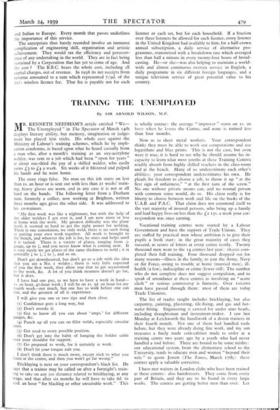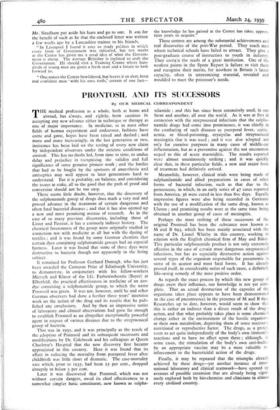TRAINING THE UNEMPLOYED
By SIR ARNOLD WILSON, M.P.
MR. KENNETH NEEDHAM'S article entitled "We- The Unemployed" in The Spectator of March r4th displays literary ability, but memory, imagination or judge- ment has played him tricks. His whole case against the Ministry of Labour's training schemes, which he by impli- cation condemns, is based upon what he heard casually from a man who, after a month's training as an oxy-acetylene welder, was sent to a job which had been "open for years" at about one-third the pay of a skilled welder, who easily earns £3 to £4 a week. Six weeks of it blistered and pulped his hands and he went home.
The story rings false. No man on this job starts on less than Is. an hour or is sent out with less than 21 weeks' train- ing, heavy gloves are worn, and in any case it is not at all hard on the hands. The following letter from a Durham man, formerly a collier, now working at Brighton, written three months ago, gives the other side. It was addressed to his co-trainees.
"My first week was like a nightmare, but with the help of the older welders I got over it, and I am now more or less at home with the work. My greatest difficulty was the plant itself, it seemed so hard to get the right power for welding. There is one consolation, we only weld, there is no such thing as putting your own work together. All work is brought to the bench, and whoever the job is for, he stays and helps until it is tacked. There is a variety of plates, ranging from i's gauge, up to and you never know what is coming next. It is very rarely we get plates of the same thickness to weld ; it is generally 4 to to 4, and so on.
Don't get downhearted, but don't go to a job with the idea that you are a No. i welder ; there is very little expected of you the first week, they allow you that to get accustomed to the work, &c. A lot of you think neatness doesn't go far, but it does.
I have had one pay, as we have to have a week in hand— Is. an hour, 47-hour week ; I will be on is. 3d. an hour for my fourth week—not much, but one has to walk before one can run, and the greatest of all is experience.
I will give you one or two tips and then close. (t) Confidence goes a long way, but (2) Don't overdo it.
(3) Get to know all you can about amps.' for different gauges, &c.
(4) Punch up all you can on fillet welds, especially circular ones.
(5) Get used to every possible position.
(6) Don't get into the habit of hanging the holder cable over your shoulder for support.
(7) Go prepared to work, for it certainly is work.
(8) Don't let your tongue rule you.
I don't think there is much more, except stick to what you learn at the centre, and then you won't go far wrong."
Bricklaying is next on your correspondent's black list. He says that a trainee may be called on after a fortnight's train- ing to take on any job distantly related to bricklaying, at any wage, and that after six months he will have to take 6d. to lid, an hour "for blackleg or other unsuitable work." This is wholly untrue: the average " improver " starts on Is. an hour when he leaves the Centre, and none is trained less than four months.
Now as to sheet metal workers. Your correspondent thinks they must be able to work out computations and use logarithms and blue prints. This is not the case, but even were it true, it is hard to see why he should assume his in- capacity to learn what most youths at these Training Centres readily absorb from highly skilled teachers in the class-room and at the bench. Many of us underestimate each other's abilities : your correspondent underestimates his own. He pleads for freedom to choose a job, to throw it up "at the first sign of unfairness," "at the first turn of the screw." No one without private means can, and no normal person with common sense would, do so. His claim really is for liberty to choose between work and life on the books of the U.A.B. and P.A.C. That claim does not commend itself to the vast majority of insured persons, who bring up a family and lead happy lives on less than ths: £2 I5s. a week your cor- respondent was once earning.
Vocational training centres were started by a Labour Government and have the support of Trade Unions. They arc staffed by practical men whose ambition is to give their pupils a fresh start : in the great majority of cases they succeed, as scores of letters at every centre testify. Twenty thousand men went to the 14 centres last year : 16,00o com- pleted their full training. Four thousand dropped out for many reasons—illness in the family, to join the Army, Navy or Air Force, owing to trouble at home (married men), ill- health (a few), indiscipline or crime (fewer still). The number who do not complete does not suggest compulsion, and to speak of attendance at these centres as involving an "acute clash" or serious controversy is fantastic. Over ioo,000 men have passed through them: most of them are today Trade Unionists.
The list of trades taught includes bricklaying, but also carpentry, painting, plastering, tile-fixing, and gas and hot- water fitting. Engineering is catered for under nine heads, including draughtsman and instrument-maker. I saw last Monday at Letchworth the handiwork of a dozen trainees in their fourth month. Not one of them had handled tools before, but they were already doing fine work, and my son treasures a finely made coin-cabinet made to order at a training centre two years ago by a youth who had never handled a tool before. There are bound to be some misfits : our educational system, from the elementary school to the University, tends to educate men and women "beyond their wits" to quote Jowett (The Times, March 17th): these centres apply a valuable corrective.
I have met waiters in London clubs who have been trained at these centres : also hairdressers. They come from every part of Britain, and they are to be found in every large works. The centres are getting better men than ever. Let Mr. Needham put aside his fears and go to one. It was for the benefit of such as he that the enclosed letter was written a few weeks ago by a Lancashire trainee to his friends.
"In Liverpool I found it easy to study politics in which every forrn of Government was ridiculed, but ten weeks at the Centre has given me a good idea of what the Govern- ment is doing. The average Britisher is inclined to crab the Government. He should visit a Training Centre where hun- dreds of young men are given a fresh start and a future to look forward to.
"One enters the Centre bewildered, but leaves it an alert, keen and confident man 'with his own tools,' certain of one fact—
the knowledge he has gained at the Centre has taken appren- tices years to acquire."
These centres are among the substantial achievements and real discoveries of the post-War period. They reach men whom technical schools have failed to attract. They give a post-graduate course of instruction to youth in industry. They contaln the seeds of a great institution. One of the weakest points in the Spens Report is failure to visit them and recognise their merits, for nowhere in Britain is latent capacity, often in unnromising material, revealed and moulded to meet the possessor's needs.















































 Previous page
Previous page